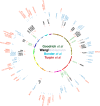Meta-analysis of human genome-microbiome association studies: the MiBioGen consortium initiative
- PMID: 29880062
- PMCID: PMC5992867
- DOI: 10.1186/s40168-018-0479-3
Meta-analysis of human genome-microbiome association studies: the MiBioGen consortium initiative
Abstract
Background: In recent years, human microbiota, especially gut microbiota, have emerged as an important yet complex trait influencing human metabolism, immunology, and diseases. Many studies are investigating the forces underlying the observed variation, including the human genetic variants that shape human microbiota. Several preliminary genome-wide association studies (GWAS) have been completed, but more are necessary to achieve a fuller picture.
Results: Here, we announce the MiBioGen consortium initiative, which has assembled 18 population-level cohorts and some 19,000 participants. Its aim is to generate new knowledge for the rapidly developing field of microbiota research. Each cohort has surveyed the gut microbiome via 16S rRNA sequencing and genotyped their participants with full-genome SNP arrays. We have standardized the analytical pipelines for both the microbiota phenotypes and genotypes, and all the data have been processed using identical approaches. Our analysis of microbiome composition shows that we can reduce the potential artifacts introduced by technical differences in generating microbiota data. We are now in the process of benchmarking the association tests and performing meta-analyses of genome-wide associations. All pipeline and summary statistics results will be shared using public data repositories.
Conclusion: We present the largest consortium to date devoted to microbiota-GWAS. We have adapted our analytical pipelines to suit multi-cohort analyses and expect to gain insight into host-microbiota cross-talk at the genome-wide level. And, as an open consortium, we invite more cohorts to join us (by contacting one of the corresponding authors) and to follow the analytical pipeline we have developed.
Keywords: Genome-wide association studies (GWAS); Gut microbiome; Meta-analysis.
Conflict of interest statement
Ethics approval and consent to participate
Ethical approval and consent to participate were acquired by each cohort, according to their local regulations and institute requirements.
Consent for publication
Consent for publication was acquired by each cohort, according to their local regulations and institute requirements.
Competing interests
The authors declare that they have no competing interests.
Publisher’s Note
Springer Nature remains neutral with regard to jurisdictional claims in published maps and institutional affiliations.
Figures

Similar articles
-
Genome-wide associations of human gut microbiome variation and implications for causal inference analyses.Nat Microbiol. 2020 Sep;5(9):1079-1087. doi: 10.1038/s41564-020-0743-8. Epub 2020 Jun 22. Nat Microbiol. 2020. PMID: 32572223 Free PMC article.
-
A gene co-association network regulating gut microbial communities in a Duroc pig population.Microbiome. 2021 Feb 21;9(1):52. doi: 10.1186/s40168-020-00994-8. Microbiome. 2021. PMID: 33612109 Free PMC article.
-
Large-scale association analyses identify host factors influencing human gut microbiome composition.Nat Genet. 2021 Feb;53(2):156-165. doi: 10.1038/s41588-020-00763-1. Epub 2021 Jan 18. Nat Genet. 2021. PMID: 33462485 Free PMC article.
-
Host genetics and microbiome associations through the lens of genome wide association studies.Curr Opin Microbiol. 2018 Aug;44:9-19. doi: 10.1016/j.mib.2018.05.003. Epub 2018 Jun 14. Curr Opin Microbiol. 2018. PMID: 29909175 Review.
-
Taxonomic composition and variation in the gut microbiota of laboratory mice.Mamm Genome. 2021 Aug;32(4):297-310. doi: 10.1007/s00335-021-09871-7. Epub 2021 Apr 24. Mamm Genome. 2021. PMID: 33893864 Review.
Cited by
-
Microbiome meta-analysis and cross-disease comparison enabled by the SIAMCAT machine learning toolbox.Genome Biol. 2021 Mar 30;22(1):93. doi: 10.1186/s13059-021-02306-1. Genome Biol. 2021. PMID: 33785070 Free PMC article.
-
Psoriasis and gut microbiota: A Mendelian randomization study.J Cell Mol Med. 2024 Jan;28(1):e18023. doi: 10.1111/jcmm.18023. Epub 2023 Dec 25. J Cell Mol Med. 2024. PMID: 38146147 Free PMC article.
-
The Computational Diet: A Review of Computational Methods Across Diet, Microbiome, and Health.Front Microbiol. 2020 Apr 3;11:393. doi: 10.3389/fmicb.2020.00393. eCollection 2020. Front Microbiol. 2020. PMID: 32318028 Free PMC article. Review.
-
The association between gut microbiome and PCOS: evidence from meta-analysis and two-sample mendelian randomization.Front Microbiol. 2023 Jul 24;14:1203902. doi: 10.3389/fmicb.2023.1203902. eCollection 2023. Front Microbiol. 2023. PMID: 37555058 Free PMC article.
-
Deciphering the causal link between gut microbiota and membranous nephropathy: insights into potential inflammatory mechanisms.Ren Fail. 2025 Dec;47(1):2476053. doi: 10.1080/0886022X.2025.2476053. Epub 2025 Mar 13. Ren Fail. 2025. PMID: 40083050 Free PMC article.
References
Publication types
MeSH terms
Substances
Grants and funding
LinkOut - more resources
Full Text Sources
Other Literature Sources
Molecular Biology Databases

